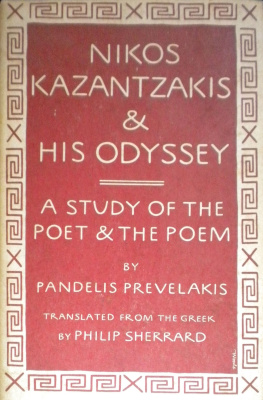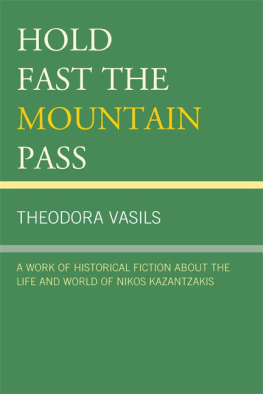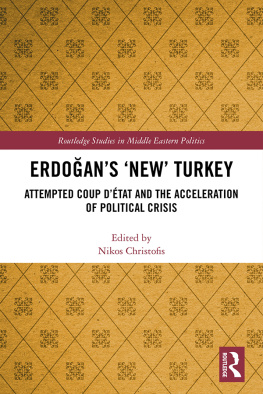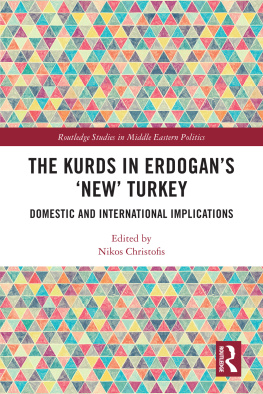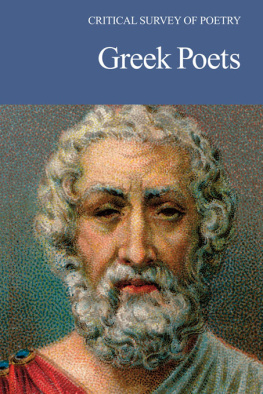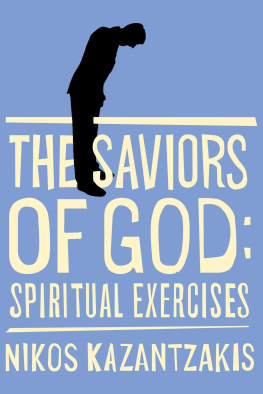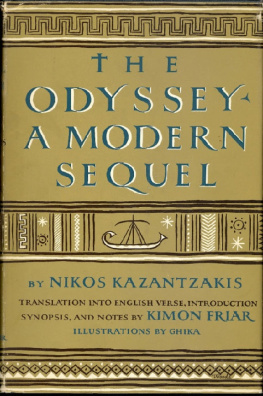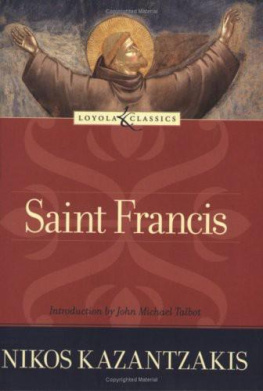Pandelis Prevelakis - Nikos Kazantzakis and His Odyssey: a study of the poet and the poem
Here you can read online Pandelis Prevelakis - Nikos Kazantzakis and His Odyssey: a study of the poet and the poem full text of the book (entire story) in english for free. Download pdf and epub, get meaning, cover and reviews about this ebook. City: New York, year: 1961, publisher: Simon and Schuster, genre: Art. Description of the work, (preface) as well as reviews are available. Best literature library LitArk.com created for fans of good reading and offers a wide selection of genres:
Romance novel
Science fiction
Adventure
Detective
Science
History
Home and family
Prose
Art
Politics
Computer
Non-fiction
Religion
Business
Children
Humor
Choose a favorite category and find really read worthwhile books. Enjoy immersion in the world of imagination, feel the emotions of the characters or learn something new for yourself, make an fascinating discovery.
- Book:Nikos Kazantzakis and His Odyssey: a study of the poet and the poem
- Author:
- Publisher:Simon and Schuster
- Genre:
- Year:1961
- City:New York
- Rating:4 / 5
- Favourites:Add to favourites
- Your mark:
- 80
- 1
- 2
- 3
- 4
- 5
Nikos Kazantzakis and His Odyssey: a study of the poet and the poem: summary, description and annotation
We offer to read an annotation, description, summary or preface (depends on what the author of the book "Nikos Kazantzakis and His Odyssey: a study of the poet and the poem" wrote himself). If you haven't found the necessary information about the book — write in the comments, we will try to find it.
Nikos Kazantzakis and His Odyssey: a study of the poet and the poem — read online for free the complete book (whole text) full work
Below is the text of the book, divided by pages. System saving the place of the last page read, allows you to conveniently read the book "Nikos Kazantzakis and His Odyssey: a study of the poet and the poem" online for free, without having to search again every time where you left off. Put a bookmark, and you can go to the page where you finished reading at any time.
Font size:
Interval:
Bookmark:
Kazantzakis both feared and admired his father, the wild beast as he called him, while he loved his mother, a holy woman (the description is again his), and suffered for her. He attributed the ambivalence of his will to the disparity of the blood contending within him (letter from Antibes, April 1950). Wherever in these notes or in the main text I cite a letter of Kazantzakis, I refer to a letter sent to me. I usually add the place and date of origin. Where the letter has been sent to another person, I give his or her name.
. Idas: pen name of Ion Dragoumis, Greek diplomat, politician and man of letters (1878-1920). Dragoumis played in Greece a role similar to that played by Maurice Barrs in France. He was the victim of political assassination.
See endnote
An association of progressive writers, educationalists and politicians founded in Athens in 1910 for the purpose of bringing Greek education up to date and introducing the popular language into the schools. It published a monthly bulletin. Kazantzakis was one of its founder-members.
Venizelos, Eleutherios (18641936): Greek politician of Cretan descent who embodied the national aspirations of the Greeks. He governed Greece on several occasions and led her to great and victorious military undertakings which resulted in the liberation of thousands of Greeks from the Turkish yoke.
Mavilis, Lorenzo (1860-1912): Greek poet from Corfu and a member of parliament. He was killed in the First Balkan War, in which he was fighting as a volunteer.
Palamas, Costis (1859-1943): Greek poet and prose writer from Patras. He is regarded as the outstanding intellectual figure of his generation in Greece, He published twenty collections of poetry, a great number of critical essays, one short story and one play. In his two long poetical works, The Dodecalogue of the Gypsy and The Kings Flute , he expressed the spirit and ideals of contemporary Hellenism.
Sikelianos, Anghelos (1884-1951): Greek poet from the island of Levcas. He published lyrical poems and tragedies. In four collections of poems with the general title Consciences , he sought to grasp the spirit of his country and his race and to interpret his own destiny as poet and mystagogue. With his American wife, Eva, he founded the Delphic Festival (1927).
Letter of Kazantzakis from Gibraltar, October 12, 1936.
Nikephoros Phocas appeared as a book in 1927, Odysseus and Christ in 1928all three in Athens, ( Odysseus was first published in the Alexandrian periodical Nea Zoi in 1922. Kazantzakis had signed it with the pseudonym A. Geranos.)
Prologue to the novel Zorba the Greek (Athens, 1946).
In addition to his original literary works, Kazantzakis also produced a notable series of translations, which he undertook for some years as a means of earning his living. The following is a list of the translations for the period 1911-15: William James, The Theory of Emotion ; Nietzsche, The Birth of Tragedy ; Nietzsche, Thus Spake Zarathustra ; Eckermann, Conversations with Goethe ; Laisant, Education on a Scientific Basis ; Macterlinck, Le Trsor des Humbles ; Darwin, On the Origin of Species ; B chner, Power and Matter ; Bergson, Laughter ; Plato, Alcibiades 1, Alcibiades 2 ; Plato, lon-Minos-Demodocus-Sisyphus-Cleitophon . All were published by the publisher George Phexis, Athens.
It is worth noting that the eviction of the Greeks from the Caucasus fed Kazantzakis imagination when he wrote the novel The Greek Passion (or Christ Recrucified ).
Kazantzakis hesitated to recognize his lifes purpose. Perhaps this explains his frequent change of pseudonym: Akritas (as columnist in the Athenian newspaper Akropolis in 1906 and as correspondent for the Athenian newspaper Neon Asti in 1907); Karma Nirvami; Petros Psiloreites; A. Geranos; Nikolai Kazan (in the foreign editions of Toda Raba ).
Galatea Kazantzakis, Men and Supermen (Athens, 1957), pp. 13741.
While still a child, Kazantzakis Odysseus raises his fists to the sky and cries: O God, make me a god! ( Odyssey , XIV, 210-12). Kazantzakis is here drawing on a personal experience, as he himself confessed to me.
Letter from Berlin to his first wife ( Letters to Galatea , Athens, 1958, pp. 141, 150).
I am leaving, I am traveling, Kazantzakis wrote in August 1922 to his first wife, not a journey of recreation, you understand. Fearful struggles go on within me. I think I shall die if I stay for long in one place. I must move in order to find something of myself, to forget the frightful command I have given myself and which I cannot fulfill ( Letters to Galatea , p. 69). Kazantzakis stayed in Vienna from. the end of May until the end of August 1922. From September 1, 1922 until mid-January 1924 he was in Berlin. His stay was interrupted by several short journeys within Germany.
Published by Simon and Schuster, 1960; translated by Kimon Friar from the revised edition of 1945.
From Letters to Galatea , pp. 106, 120, 122, 123.
Kazantzakis impressions of Russia were first published in the Athenjan newspaper Elevtheros Logos between November 20 and December 27, 1925. A second series, inspired by his new journey to Russia (OctoberDecember 1927) was published in the Athenian newspaper Proia from January 8, 1928 on. Later a selection from the first and second series of articles appeared in book form with the title What I saw in Russia , 2 vols. (Athens, 1928).
Kazantzakis impressions of Palestine, Cyprus, Spain and Italy were published in the Athenian newspaper Elevtheros Typos . His impressions of Egypt and Sinai were published in the Athenian newspaper Elevtheros Logos . A selection from these articles constituted a book entitled Traveling: Spain, Italy, Egypt, Sinai (Alexandria, 1927).
Thus Kazantzakis himself describes Ni e tzsches appearance in England (Athens, 1941), p. 182.
Eleni Samios was then in Paris. She had met Kazantzakis in 1924. In the same year they had spent a few days (August 18-28) on a coast of southern Crete, and in September 1925 they met for one week on Amorgos. In the spring of 1926 they made the journey to Palestine and Cyprus together with two woman friends. On that journey Kazantzakis gave Eleni the Hebrew-like name of Lenotschka Dybouk which we find in the dedication of the Odysseus (1928). July 1926 they passed together on Mount Pelion. They met again in Russia in 1928, and from then on were never separated except for short periods. Kazantzakis testified at every opportunity to his love and gratitude to the brave, devoted and proud companion. To Eleni, he wrote to me from Antibes on May 4, 1957, I owe all the daily happiness of my life; without her I would have died many years ago.
Nikos and Galatea Kazantzakis (the latter of the Alexiou family) lived together from 1910 to 1924. During those fifteen years Kazantzakis was frequently absent from his home. He toured Greece with Sikelianos (1914-15), he stayed in the Mani working in a lignite quarry (1915), he traveled to Switzerland (1917-18), to the Caucasus (1919), to Crete, France, Germany (1920-21), to Austria and Germany (1922-23), to Italy (1924), et c .
Stavridakis, Yannis: Greek diplomat of Cretan descent, childhood friend of Kazantzakis, He served as Greek consul in Zurich, where he gave Kazantzakis hospitality for about a year (1917-18). To gether they undertook the repatriation of Greeks from the Caucasus. Stavridakis died during this operation.
See note 2.
Plato, lon , 534 b.
Letter from Antibes, May 4, 1957. Many indications of Nietzsche's influence on Kazantzakis are to be found scattered in the latter's articles from Paris in the Athenian newspaper Neon Asti in 1907-9. Particularly worth noting is Kazantzakis article on Nietzsche in the Athenian newspaper Elevtheros Typos on August 22 and 26, 1926, for the 26th anniversary of his death. Equally important is the canto that Kazantzakis dedicated to Nietzsche (the periodical Nea Estia , Athens, August 1, 1938). If in sketching Kazantzakis character and in interpreting the significance of his behavior we continually refer to Nietzsche, this is chiefly because Nietzsche was the first Martyr: A nature like that of Nietzsche must have known, leaping forward a generation, the wretchedness which we now know; what he endured, alone and misunderstood, thousands endure today (Hermann Hesse, Der Steppenwolf , Prologue).
Font size:
Interval:
Bookmark:
Similar books «Nikos Kazantzakis and His Odyssey: a study of the poet and the poem»
Look at similar books to Nikos Kazantzakis and His Odyssey: a study of the poet and the poem. We have selected literature similar in name and meaning in the hope of providing readers with more options to find new, interesting, not yet read works.
Discussion, reviews of the book Nikos Kazantzakis and His Odyssey: a study of the poet and the poem and just readers' own opinions. Leave your comments, write what you think about the work, its meaning or the main characters. Specify what exactly you liked and what you didn't like, and why you think so.

